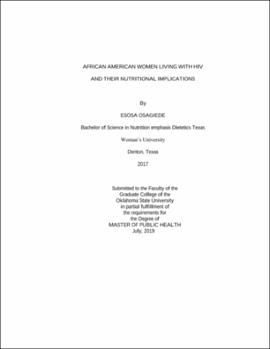| dc.contributor.advisor | Hubach, Randolph | |
| dc.contributor.author | Osagiede, Esosa | |
| dc.date.accessioned | 2020-06-29T17:39:15Z | |
| dc.date.available | 2020-06-29T17:39:15Z | |
| dc.date.issued | 2019-07 | |
| dc.identifier.uri | https://hdl.handle.net/11244/324903 | |
| dc.description.abstract | HIV is still an epidemic. According to HIV.gov, more than 1.1 million people in the US are living with HIV and less than 14 percent know their status. The Southern states account for over 50% of all new HIV infections. Although there has been ongoing innovations in medicine and care, the statistics among the African Americans (AA) living with HIV continues to grow. In Oklahoma for example, the rate of Black males living with an HIV diagnosis is 3.5 times that of White males and the rate of Black females living with an HIV diagnosis is 6.8 times that of White females. Geographic isolation and poverty among societal factors increases this disparity. There is a continued need for research which focuses on AA women living with HIV for several reasons however the most important reason is that they account for over half of the heterosexual population living with HIV in the United States today. Complications related to HIV/AIDS is one of the leading causes of death among African American women. Historically, HIV research has focused on homosexual white men and the high-risk behavior such as unprotected sex and injection drug use. African Americans differ from other groups when it comes to risks factors due to socioeconomic vulnerability, such as poverty, and spending time in a detention facility particularly men. Due to the rise of incarceration of men, African American women are at a higher risk of acquiring HIV. After a diagnosis, African Americans have a low adherence rate to medication and diet leading to death. Many AA women living with HIV are unaware of how their diet can affect their immune health. As such, there is need to evaluate the barriers to proper nutrition education and nutritious food. Ultimately, such data will inform larger public health programming to be culturally relevant for this population. | |
| dc.format | application/pdf | |
| dc.language | en_US | |
| dc.rights | Copyright is held by the author who has granted the Oklahoma State University Library the non-exclusive right to share this material in its institutional repository. Contact Digital Library Services at lib-dls@okstate.edu or 405-744-9161 for the permission policy on the use, reproduction or distribution of this material. | |
| dc.title | African American women living with HIV and their nutritional implications | |
| dc.contributor.committeeMember | Rhoads, Kelley | |
| dc.contributor.committeeMember | Kennedy, Tay | |
| osu.filename | Osagiede_okstate_0664M_16289.pdf | |
| osu.accesstype | Open Access | |
| dc.type.genre | Thesis | |
| dc.type.material | Text | |
| dc.subject.keywords | african american women | |
| dc.subject.keywords | black women | |
| dc.subject.keywords | hiv | |
| dc.subject.keywords | nutrition | |
| thesis.degree.discipline | Public Health | |
| thesis.degree.grantor | Oklahoma State University | |
